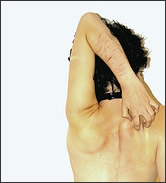Lent in the Christian tradition is a time of sacrifice and penance. It also is a period of purification and enlightenment. Pain purifies. It atones for sin and cleanses the soul. Or at least that’s the idea. Theological questions aside, can self-inflicted pain really alleviate the guilt associated with immoral acts? A new study published in Psychological Science, a journal of the Association for Psychological Science, explores the psychological consequences of experiencing bodily pain.
Psychological scientist Brock Bastian of the University of Queensland, Australia and his colleagues recruited a group of young men and women under the guise they were part of a study of mental and physical acuity. Under this pretense, they asked them to write short essays about a time in their lives when they had ostracized someone; this memory of being unkind was intended to prime their personal sense of immorality—and make them feel guilty. A control group merely wrote about a routine event in their lives.
Afterward, the scientists told some of the volunteers—both “immoral” volunteers and controls—to stick their hand into a bucket of ice water and keep it there as long as they could. Others did the same, only with a soothing bucket of warm water. Finally, all the volunteers rated the pain they had just experienced—if any—and they completed an emotional inventory that included feelings of guilt.
The idea was to see if immoral thinking caused the volunteers to subject themselves to more pain, and if this pain did indeed alleviate their resulting feelings of guilt. And that’s exactly what the researchers found. Those who were primed to think of their own unethical nature not only kept their hands in the ice bath longer, they also rated the experience as more painful than did controls. What’s more, experiencing pain did reduce these volunteers’ feelings of guilt—more than the comparable but painless experience with warm water.
According to the scientists, although we think of pain as purely physical in nature, in fact we imbue the unpleasant sensation with meaning. Humans have been socialized over ages to think of pain in terms of justice. We equate it with punishment, and as the experimental results suggest, the experience has the psychological effect of rebalancing the scales of justice—and therefore resolving guilt.

